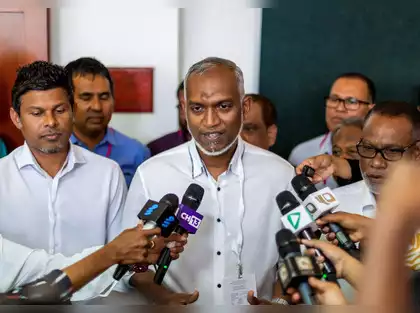

The Maldives is grappling with a severe economic crisis, with total public debt reaching approximately $8 billion, or 122.9% of GDP, as of 2023. This alarming figure includes $3.4 billion in foreign debt primarily owed to India and China. President Mohamed Muizzu, who leads the Peoples’ National Congress (PNC) with a supermajority in the Majlis, is under pressure to implement strategies that will stabilize the economy and restore confidence among international investors [d1aef223].
In September 2024, Moody's downgraded the Maldives' credit rating, citing increased risks of default, which has heightened concerns about the country's financial management. The Maldives requires urgent foreign exchange infusion, needing $114 million in 2024, $557 million in 2025, and a staggering $1.07 billion in 2026 to avoid default [d1aef223]. As of late August 2024, gross foreign currency reserves stood at $437 million, a precarious position given the country's economic obligations [d1aef223].
In light of these challenges, experts suggest that the Maldives can revive its economy through sustainable growth practices. The UNDP has been instrumental in assisting the Maldives for 45 years, helping the nation progress in governance and environmental stewardship. The country has averaged 7.4% GDP growth over the past 40 years, with per capita income reaching $22,362 by 2023. However, tourism, which employs only 12% of the labor force, and the fisheries sector, whose GDP share has declined from 6% to 3.5%, indicate a need for diversification [7888d7c5].
President Muizzu's administration is actively seeking to boost foreign currency inflow while curbing black market remittances, a significant issue affecting the economy. The tourism sector, which contributes about 30% to GDP, remains crucial for recovery, although it has been impacted by recent economic strains [d1aef223]. Inflation is projected to rise to 7.3% in Q4 2024, adding further pressure on the Maldivian economy [d1aef223].
To address the financial crisis, the government is working on spending cuts and tax hikes. Relations with India have notably improved after initial tensions, and Muizzu is pursuing a $400 million currency swap with India to enhance liquidity [d1aef223]. Meanwhile, China has agreed to defer loan repayments for five years, providing some breathing room for the Maldivian government [d1aef223].
The Maldives' heavy reliance on fossil fuels, costing $537 million annually, and its importation of 90% of food needs highlight the urgency for sustainable practices. Transitioning to a Blue Economy model could provide a pathway for economic resilience and sustainable growth [7888d7c5]. As the government navigates these challenges, the urgency for comprehensive fiscal reforms and transparent financial management remains paramount to restore confidence and ensure sustainable economic recovery [d1aef223].